Keynote Speaker At The Texas Art Education Association Conference
I am thrilled to be chosen as the keynote speaker for the Texas Art Education Association conference to be held November 2017 at Moody Gardens Galveston.
Throughout my career as an artist and a writer it is as important to me to share information and create a learning experience through the creation of my art as it is for me to create the art itself. At the 56th annual conference I will be speaking about the educational initiative title STEAM. I’ll share how others have used , Science, Technology, Engineering Art and Math in an interdisciplinary learning experience and how I have done that in my own studio.
Of course the Alice in Wonderland project title “Move One Place On” has the STEAM education in spades.
I’m delighted to be presenting and can’t wait for November.
Making Friends With The Deceased- Being a Part of Family and History
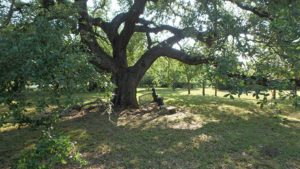
When I’m not sculpting monumental Alice in Wonderland characters, you may often find me making friends with the deceased. That is what someone told me years ago. It took me aback, but I realized that is what I do. I create posthumous sculptures, and like the video for Texas Country Reporter states, I get to know my subject very personally and at special times I’m now realizing, I get adopted into a family. I can feel that now as I work with my new sculpture of Norma Zenteno, an incredible musician who died of breast cancer. The “feeling like family” and becoming friends also extends to those four-legged critters as part of the Norma project I’m sculpting Kippy, a rescue dog from Barrio Dogs. I feel the warmth of family in this new commission, and this weekend I felt the warmth of family as I visited an old friend.
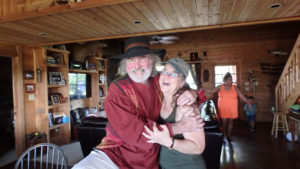
I sculpted Patsy over 11 years ago in 2005/2006. Looking back it was an interesting time of transition. I had just built my new studio behind my home, began a regular blog on my website, and was writing a book on the process of sculpting the deceased- still unpublished.
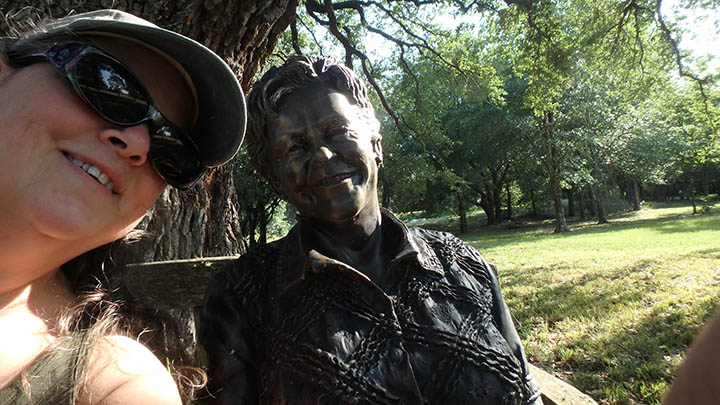
A few years ago I began to receive invitations to a family party on the Patren Ranch. This is a ranch that has been in Patsy’s family for over 100 years. David, Patsy’s son and his wife Becky live on the property. David is also a musician so besides visiting the sculpture of Patsy under a large old oak, where “tree Whisky” hangs, there is always great live music. Though it is a long drive home, I had to stay late, just to hear David play his fiddle and see the family begin to join in on the revelry. If you know me, you know I’m all about the music, either dancing or joining in on harmony, it is one of those other favorite things that I do. The rolling hills and the old refurbished family home, now a museum complete with the German history of the area leaves me feeling nostalgic and sentimental. Clusters of Blacked-Eyed Susans crop up in wild areas, and crickets hop over my sneakers on patches of dry mowed lawn as I wonder the fields. An olive grove was put in by Patsy’s husband, Howard a few years back and I’m tickled to go see the progress. I ramble past the new old “kitchen” building. Howard tells me they are building it from reclaimed wood. I hear it will be the “music” building. I have longed for property for which to grow my business, and for which to grow historical relevance and pass on to the family. While walking through the main house, a charming young man grabs my hand, shakes it hard, and says, “I’m Cody, Howard’s grandson, I’m so pleased you are here.” His intensity, charm, and warmth radiate from him. I watch later as it spreads on stage with his singing. I know very few people invited to this gathering save for Howard, Patsy husband and Jennie, Patsy’s best friend who posed for the sculpture. But the family embraces me like I’m a relative who has been away on a journey. With the tight schedule of the Alice Project, I have been away and have not been able to attend a Patren Ranch party in a while. It is good to be back.
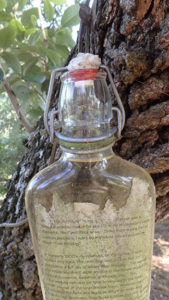
The story is told that Patsy’s
grandpa had a still. Grandma didn’t believe
in drink, so her grandpa
would hide the whiskey bottles
high up in the trees.
The workers could be found taking
more than a rest under one of these old trees
Howard and I sit by the new pool, as the sun sets over the rolled up bales of hay in the field, me dangling my toes in the water and talking as I watch the family dogs jump in and sit on the pool ledge slightly submerged in the water. I am sure this was built for them. They bound out, sniff me and Howard, and then chase after their mates clearing the small stone fence like graceful equine jumpers. It is a playful ritual that is repeated several times during our visit and endears me to the family, and property all the more. I sip a frozen margarita and Howard and I talk about the last ten years and my career. It forces me to reflect on my accomplishments. I’m glad I brought him a copy of my book. I’m extremely thankful for all of the commissions that have brought me to this point in my life.
Later, a young woman gathers around my prime seat in front of the stage, my space where I have parked my things for the last several hours. She says, “I need a chair like that. It looks so comfortable.” I tell her it is my camping chair and stool. “Do you go camping a lot,” she asks. “I love to,” I say. Her reply makes me laugh, ” Well I am not a camper but I like sitting and that is a fine chair for that.” Not long after that I pack up my “fine chair” and prepare for my long drive down the back country road to Houston.
The music, the family, the incredible refreshing property that is Patron and the memories have refreshed me. I think of all the people who have referred to my sculpture and said, “I’m so glad we have Patsy to visit.” I have become a part of a memory, a part of the history of this family and this property through my work. I’m so very honored. Thank you, Patsy.
Installation Of a Sculpture John Turner
The casting of John Turner is actually featured on Bridgette Mongeon’s main website. Check out
Preparing to Sculpt
Making a Mold
The Wax
Casting and Metal
Delivery and Installation
Also: This is a sculpture created of John Turner for the city of Frisco. The entire project is documented on a project blog at https://johnturnersculpture.blogspot.com/
We followed along on the prep of a bronze sculpture in the last post. Now, let’s see how this is installed.

On my second day of travel, the John Turner sculpture and I end our journey at Frisco Heritage Center. This is a charming place to visit with old buildings. I can’t help look at the area and dream of benefactors that will let me create period bronzes with the faces of their loved ones that will enhance the visiting experience. I see bronze sculpture of children from history gathering in the school yard, or a boy and his dog playing on the porch of the old cabin. A family, in period costume, running to catch the train at the Frisco Depot or a black smith working in the blacksmith shop.
I only take moments to see these creative, inspirational bronze apparitions as we must quickly get to work. I arrive at 10 and we estimate this will take about 2 hours. I’m happy to see strapping young men and art handlers of Unified Fine Arts. They will come in handy when trying to lift out a 350 lb sculpture.
We watched the prep of this at the foundry and on site in the previous post. Now, let’s look at the rest of an installation. Together Unified Fine Arts, Nouveau Construction and myself go over he plans for the installation. I can’t be at every install, as my schedule and the travel will not always permit me to be there. In those cases I have strong communication with my clients, delivery and installers. However, I’m delighted to have been able to be at the install of John Turner. The slab has been poured, cured and ready. After Unified Fine Arts carefully unwraps the sculpture we begin to look at placement. I’m thinking of many things when placing a sculpture. Some of these things I have taken into consideration all the way back when creating the sculpture in the studio. Design questions I ask myself are:
- In what direction is my subject looking?
- What are the elements surrounding the sculpture that may interfere with the visual design?
- How does the sculpture look when you are approaching it?
- Does the placement of the design look good in configuration with the slab?
The men at Unified Fine Arts are patient. I wonder if they think I’m like a woman moving heavy furniture in a room, “No, the sofa may look better over there, but I don’t know, can I see it again?” I am a visual person by nature and so I often will move and fudge a sculpture, try one thing and another until both I and my client agree. The added visual element we had to concern ourselves with is the dedication plaque. The plaque will rest flush with the ground. I’m concerned as to where it is placed if people are taking pictures. I know children will love to come and see the dog. Adults may want to pose next to or behind John. I’d like to see it not be stepped on that much. Once we have exhausted our option we vote for the plaque to the right in front, and John facing the parking lot as if he is walking to go home. I do wish this concrete were stained the color of the other pavement, or ideally I would have loved it if the pavement circled around or he was put in an existing walkway. But this is what we have to work with and it does look fabulous.
InstallationOnce we have the placement of all of the visual elements I trace the places where the sculpture touches on the concrete with a pencil. Then the template is set in place and the holes are traced so the installers know where to drill. They drill holes into the concrete a bit wider than the threaded rods that I have provided.
Dry FitOnce the holes are cleaned out with an air compressor the installers prepare for a dry fit. They lift the sculpture and place the sculpture with the threaded rods extended out of the bronze, and place the piece into the holes. This is where a sledge hammer may come in handy. If the person drilling the holes did not drill them perpendicular to the slab then the rods will not fit in properly or if the foundry did not weld the nuts perfectly perpendicular then this will also be a a problem. The solution is to lift the sculpture out and either drill the holes more, or bang the rods into place with a sledge hammer.
Securing the sculptureOnce the dry fit is complete the sculpture with its threaded rods is lifted out and then epoxy is put into the holes. Carefully the sculpture is set back into place. The epoxy will cure quickly and secure the sculpture. Once complete, I walked around the park to see how the sculpture looks from all directions. I am more than pleased. My work is done here. The sculpture is now covered with a cloth to prevent others from seeing it until the unveiling. I often like to attach a small note to the tarp saying what it is and when it will be unveiled. I think this is an invite for others and prevents curious eyes from being tempted to take the tarp off and look for themselves.
Now for my long ride home. The van feels empty without the 350 pound sculpture, but my schedule is now just a bit lighter as I move on to a portrait bust and the sculpture commission created in loving memory of Norma Zenteno and in support of Barrio Dogs. I’m also still monitoring the bronze casting of the Alice in Wonderland sculpture of the monumental scene of the Mad Hatter’s Tea party created for Evelyn’s Park called “Move One Place On.” I’m also writing a book about the creation of this sculpture similar to my last book.
I kissed the dog goodbye. I have a long and emotional creative process with him and I had no idea until I left. I was going through the loss of a family pet when my children lost their home in a fire in February. If you feel some extra emotion coming from this dog, it is that love and tears that were put into the clay. I’ll be back up here next weekend for the unveiling. I can’t wait until John Turner sees the sculpture. I know you will ask, “How can he see it? he is blind.” That is the thing about sculpture and 3D work, it is meant to be touched.
Installation Of A Bronze Sculpture – Preparation
The casting of John Turner is actually featured on Bridgette Mongeon’s main website. Check out
Preparing to Sculpt
Making a Mold
The Wax
Casting and Metal
Delivery and Installation
Also: This is a sculpture created of John Turner for the city of Frisco. The entire project is documented on a project blog at https://johnturnersculpture.blogspot.com/
Installation of a bronze sculpture really depends on the size, location and base where it will be mounted.
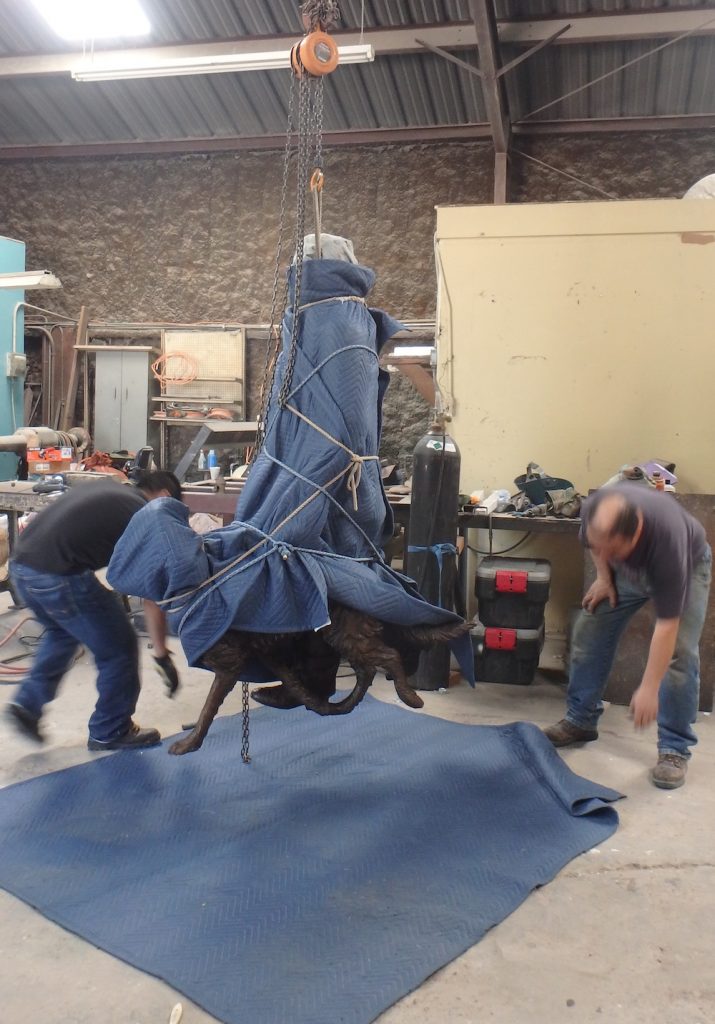
Plenty of time should be planned for installation. If you are trying to set up an unveiling of a sculpture it is best to plan weeks in advance for the installation. Installation and delivery can be stalled by weather. I have, at times, also had deliveries rerouted because of wildfires. Giving plenty of time for pouring and delivery is important.
Miguel Macia works carefully at his foundry. We have seen all of the work that has gone into the sculpture up to this point. It has its final patina and so great care is taken not to scratch the art.
First a pattern must be made.
Some installers may not need this, but I find it is nice to have.
Internal mounting structure
John is placed on his side. You will see nuts that the foundry has welded inside of the sculpture. There are 4 points of contact. There is a nut in Johns toe, one in his heal, one in the front leg of the dog and then a nut in the back leg. It is preferred that all sculptures have at least 3 points of contact. If they do not, then this must be bid and prepared long before this stage. The foundry would need to weld stainless steal in the sculpture to engineer the sculpture properly. In larger sculptures engineers would be brought in on the job to be sure that everything is safe.
Threaded Rods Threaded rods are now threaded into the sculpture and then a cardboard pattern is made. The rod is pushed through the cardboard and then the feet of John and the dog are traced. Now we will see how all of this prep work comes together in the installation of the bronze.
Prep at the Site
Nouveau Construction created the concrete slab at the site. I sent them specifications as to how deep and wide the slab would need to be to accommodate the weight of John and his dog and to look aesthetically pleasing. Ideally I would have loved to see John on a continuous walkway, with the same look as the other walkways, instead of just on a pad. I really love it when my sculptures just blend in with their surroundings.
With the concrete poured and the sculpture loaded we keep an eye on the weather and plan our route. I also take the following:
- Extra patina, brushes and wax, just in case the sculpture is accidentally scratched.
- A torch to melt the wax
- All of the clients reference material
- A release form
- A form that describes the care of a bronze
- A sledge hammer. If someone else is installing the sculpture they might bring a sledge hammer. You will see the use of this at installation.
Transportation of a sculpture can happen in a variety of ways. I have fit many a body in the back of my van and when possible I like this way best. An enclosed vehicle makes me feel like the sculpture is safe, and I often have to make stops and sleep along the way. Though I carry insurance on all of my sculpture projects safety is important for me. I don’t want anything to happen this late in the game.
If I were to transport John and his dog on a trailer he would not be covered. My art shipping company of choice is Acts Crating and Transportation. They ship all of my work, unless a foundry offers shipping at a better price. If a sculpture is shipped on an open bed the flapping of the tarps can sometimes rub off the patina. If he were on a trailer he would be on a very interesting walk from Houston to Frisco, Texas.
Author: Sculptor Bridgette Mongeon
Finishing At The Foundry
The casting of John Turner is actually featured on Bridgette Mongeon’s main website. Check out
Preparing to Sculpt
Making a Mold
The Wax
Casting and Metal
Delivery and Installation
Also: This is a sculpture created of John Turner for the city of Frisco. The entire project is documented on a project blog at https://johnturnersculpture.blogspot.com/
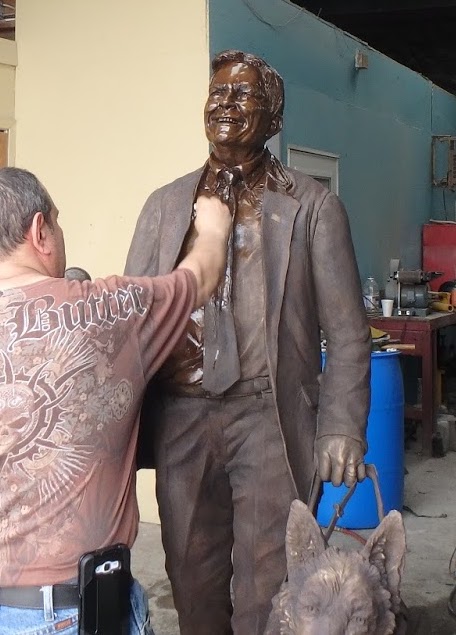
We have watched John and his dog go through the casting process now it is time for the finishing process. I work closely with Miguel Macias . This part of the process takes a few visits. I go over the sculpture carefully marking any blemishes. Then Miguel painstakingly goes over the sculpture grinding, bending and finishing portions.
Finally it is patina day. To patina the sculpture Miguel heats up each area and applies different chemicals to cause the metal to have a chemical reaction. It is a long process and I often will stay the day, or morning while they are working on the piece. A final coat of wax is put on to protect the sculpture and we make arrangements to pic up John and his dog.
It has been a long journey to here but I’m thrilled with the end results.
Kippy— A Rescue, A Cause, And A Companion
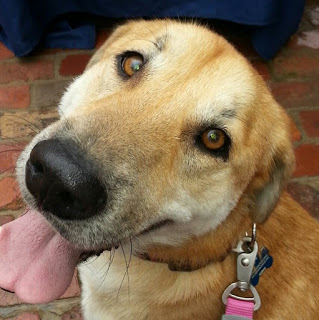
The sculpture that I am creating is of Norma sitting and singing, but with the sculpture of Norma there will be a special companion- Kippy. Kippy is a rescue dog that died of cancer. Kippy will be watching Norma Play. Below is a video with Norma singing about Barrio Dogs and another of a performance with Norma.
Today I xeroxed Kippy to size and printed out some images so she could become a part of the studio. I also wanted to see if the size given to me was indeed the true size. We will start on her armature soon.
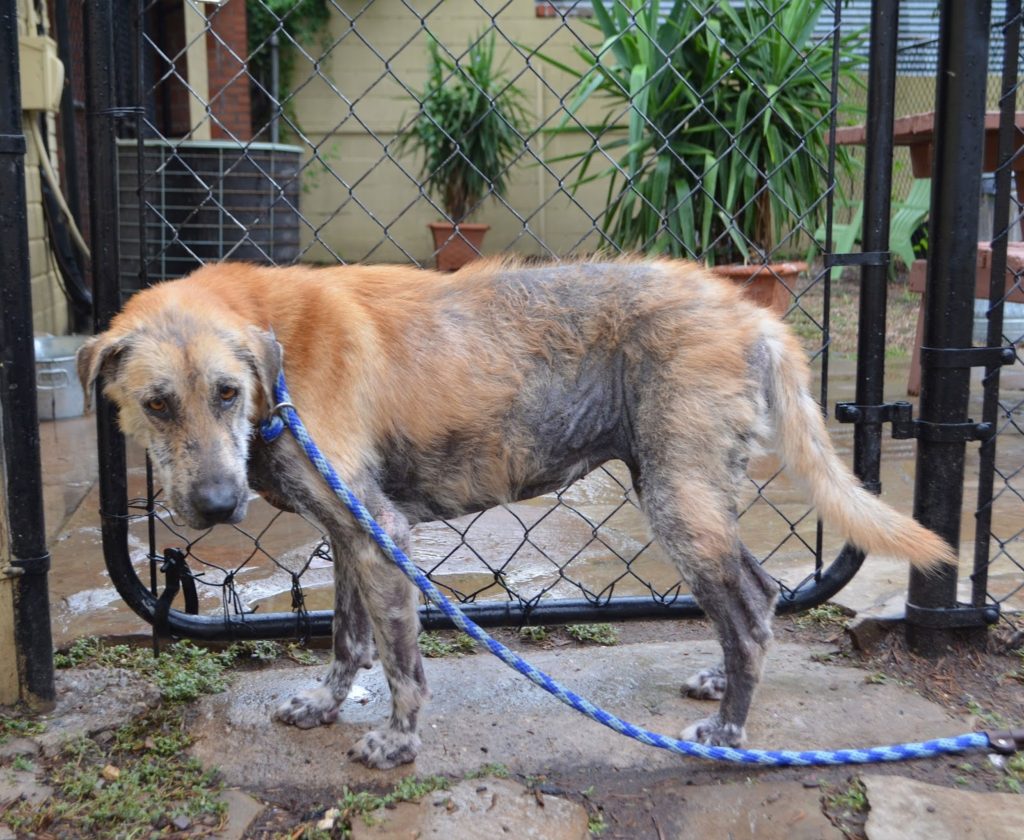
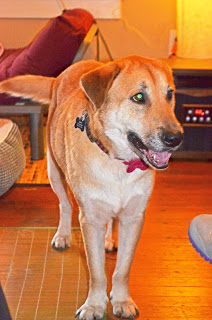
Norma began Barrio Dogs with her sister in law Gloria Medina Zenteno. I asked Gloria to talk about Kippy.
Kippy is a she, all of Barrio Dogs rescues are special and they wish they all could be included in this project, but Kippy made an impact to many. She was found living across the street from the school KIPP Intrepid on Lawndale and Telephone Road, hence her name “KIPPY”. Had she been a male they would have named her KIPP…any of the students and teachers felt helpless about what to do for her because she was very skittish and sick. Barrio Dogs jumped in to save the day. They started feeding her and rescued her… It took a few months to build trust.
Even the vice principal jumped in on the day of rescue. She stopped traffic as many watched the rescue take place. Barrio dogs rescue team took her right to Gulfgate Animal Hospital.
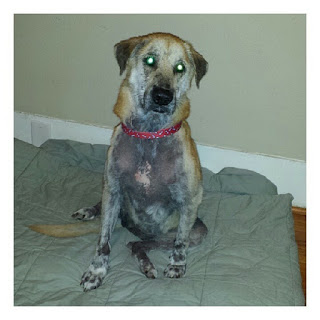
There was lots of medication and a wonderful foster named Kim. Kippy was rehabbed to be the most beautiful girl, she loved all dogs, even cats, children and adults, there were no issues with her behavior, she was such a happy girl. Kim fostered until her s in New Mexico. She lived only a couple of years more, maybe less and then died from cancer. Barrio dogs saw a connection between Kippy and Norma. Gloria Medina Zenteno suggested Kippy for the project and the entire Barrio Dogs board agreed unanimously.
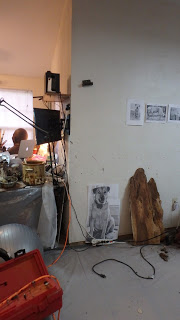
This is the documentation of Sculptor Bridgette Mongeon who created the Norma Zenteno Sculpture and Kippy for Zenteno Spirit and Barrio Dogs. You can find the process blog for this project at http://normasculpture.blogspot.com/
Look Past The Whimsy To The Love
Today I went to Evelyn’s Park. I have not been there since the grand opening April 22, 2017. The grand opening for me was exciting, but also a little bit sad, I had hoped my sculpture would be there for all to enjoy.
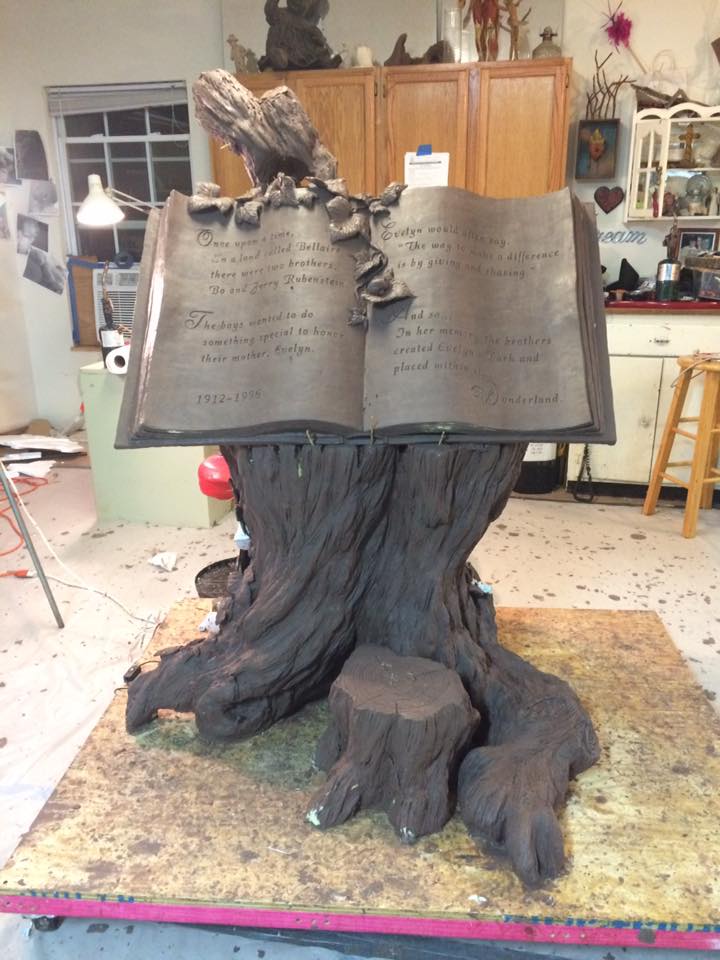
Today I went to the park, and especially the memorial garden. Many may not know that there is a special place in the park. It is on the south-east corner of the park and is called Evelyn’s Memorial Garden. You will know it because the pathway changes. It goes from pea gravel to gray brick. In the middle of this memorial garden, there is a spot that is filled with brown mulch and empty. That is where the sculpture of the Mad Hatter tea party will go.
I was delighted that the hard work of the Rubnestein family and foundation had finally come to fruition. It was a long road for them, and they worked hard to get the park to this point. No one, but them and those who dedicated themselves to getting the park done, knows how hard that was. I wanted to go there today and think about that. I wanted to think about Evelyn and how thankful I am that I have been a part of creating a memory in honor of a woman that will be cherished by many. A memory that two boys began, because they loved their mom. I’m thinking back to the dedication plaque
I think we are all so caught up in the idea of the whimsy of the sculpture, and the hidden objects, that somehow the love, the true meaning of this sculpture has been overlooked. Today I went to Evelyn’s Park and talked to Evelyn. On my way. I was overwhelmed with the need and sorrow that I did not bring a rock. I am not Jewish, but my best friend is, and I grew up surrounded by the Jewish culture. Because I also create many sculptures of deceased loved ones I have studied death and the traditions surrounding death. The Jewish traditions surrounding death are some of the most endearing. But my urgency for a rock came from a simple custom combined with my absolute love of rocks. I collect them from wherever I go. Rocks line my window sills. In the Jewish tradition, it is customary to bring a rock to the grave of a loved one.
In article I found on my Jewish learning they quoteRabbi Simkha Weintraub, rabbinic director of the New York Jewish Healing Center . “They say that by placing the stone, we show that we have been there, and that the individual’s memory continues to live on in and through us.”
I don’t know where Evelyn is buried, but I want to celebrate her life. I have studied her as I was also commissioned to do a sculpture of her for the Evelyn Rubenstein Jewish Community Center. I have been celebrating her life all through the last few years by creating this sculpture. Her children have celebrated her by creating this park, and by commissioning me to do this sculpture for the park in her memory. I do know she was an amazingly strong woman, and I hope I can have her strength, courage and business sense as I proceed in my life. I have decided that I may go and walk this pathway once a week until the sculpture is placed. Don’t be surprised if you see random rocks in the midst of the empty spot. I will be culling through my personal collection and placing them there to honor Evelyn and her memory.
If you go to the park, after the sculpture is installed, look behind this book and dedication plaque. If you see a rock, now you will know what it means, and perhaps you will know that I have been there, or maybe others, and that her memory is indeed continuing to live on, in and through us. We are celebrating the memory of her and finding her love through the whimsy.
Dedication plaque reads…
Once upon a time,
In a land called Bellaire, there were two brothers,
Bo and Jerry Rubenstein.
The boys wanted to do something special,
To honor their mother, Evelyn.
Evelyn would often say,
“The way to make a difference is by giving and sharing.”
And so, in her memory,
The brothers created Evelyn’s Park
And placed within it
Wonderland.
-2016-
My Work In The Museum Of Fine Art- Houston
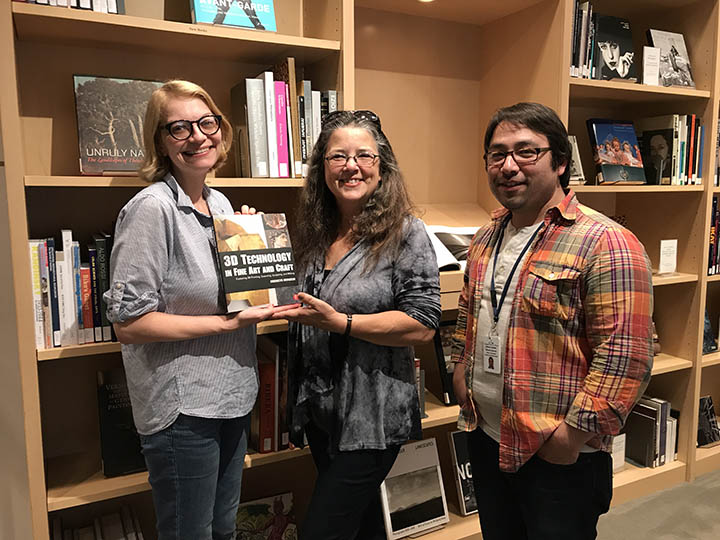
What artist wouldn’t be delighted to have their work a part of the collection in the Museum of Fine Arts. Well, I can say mine is. Well, not my artwork, but my book. Today the Museum of Fine Arts Houston accepted my book into the Hirsch Library. Chief Librarian Jon Evans and I spoke at the end of last year, and this is the first chance I have had to get down there and bring my book. The book focuses on a lot of fine artists around the world who are using digital technology in their fine art. Last year I found a post on Linked in from Robert Kimberly, an art installer at the MFA. He purchased my book to understand more about one of the pieces he was installing. It was dragon bench by Joris Laarman. I had no idea the MFA Houston even owned a work by the artist that I featured in my book. There are many very prominent artists in this book. I’m honored to have had their acquaintance when writing it. I’m even more tickled that it is now a part of the permanent collection at the Hirsch Library. It may be a small thing to others, but for me, to have my book both in the Albright Knox collection and in the MFA Houston, well it is big.
Now, my next goal is to lecture at the MFA about these artists, their process and how digital technology is being embraced by many fine artists, as well as how it is infiltrating some of the traditional sculpting processes. More on that soon… I hope.
Meeting Those Involved In Fundraising
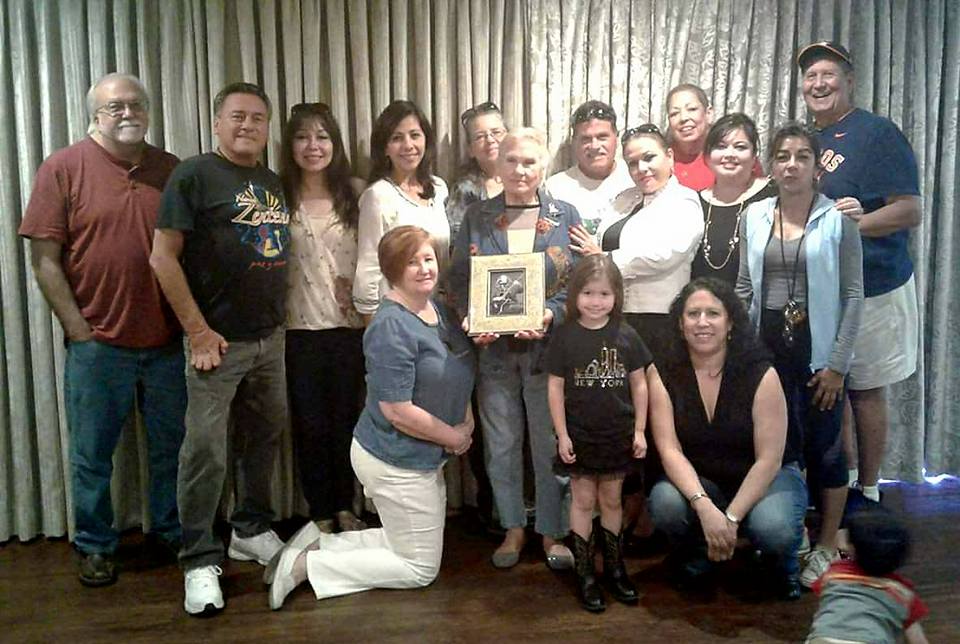
This entire project is full of history. Today I got a chance to meet the incredible gang of people who are working on fundraisers for this project.
We met at Morales Radio Hall. I just learned the Houston history of this building on the east side, It was one of the first Spanish speaking radio stations started in 1950 KLVL-AM. Here is a link to some of the history of the television station started by Felix Hessbrook Morales.
The Morales family has been inspirational in fundraising for the Norma Zenteno project.
Thanks to everyone on the committee for their hard work. I encourage everyone to share the blog posts and the project on their social networks. Remember, every bit of money toward this project helps. I think we should have a special preview viewing of the sculpture after approval at my studio for those who give the big donations. Can’t wait to get started sculpting.
Remember you can also donate on the Norma Zenteno Sculpture Project website.
This is the documentation of Sculptor Bridgette Mongeon who created the Norma Zenteno Sculpture and Kippy for Zenteno Spirit and Barrio Dogs. You can find the process blog for this project at http://normasculpture.blogspot.com/
Music And “Mine”
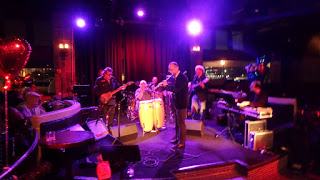
Music
Today I had the incredible privilege to hear the Zenteno band play. What a treat. I arrived out of a business meeting late at Sambuca’s after scrambling to park my huge van downtown. The presence of the band was impressive. The personas of each of the individuals in the family changed when on stage. You can tell that for them… this was home.
This video is old and shows Norma playing with her dad.
It was an emotional night as one of the musicians Lindy Pollard was leaving Houston and this was his last time playing with the band. If I recall this history correctly, he has played with a member of the Zenteno family for 40 years.
The warmth from family and friends and the looks on their faces when we began to talk about the sculpture was endearing. Each person added to the intensity, passion and life of this sculpture through their sharing. I encourage you please share both stories and photographs on the Norma Zenteno sculpture page. These stories help me to bring life to the sculpture.
Time and time again, I have heard people say that they still feel Norma, or have had “Norma” experiences since her passing. I listen intently as each experience is so very personal, so very touching. I get the feeling that Norma embraced the essence of each person she met. Cherished them and made them feel special.
MUSIC FOR ME.
Many know me as a sculptor. Few people know that when I was in high school I vacillated for a time about whether I should be an artist or a musician. My childhood experiences with music were like many. I took piano, because my sister took piano, it was in the house and what you did. Though I have to say that reading music and spending hours plucking out notes to songs that were way harder than I could play, was probably my first inclination that I was self motivated. I also played to sing. I love to sing.
In grade school I took flute, but family life and other distractions made it impossible to focus and so that was not a good experience. It was not until I was in Junior high that I thought I might like to learn guitar. I got a paper route and worked it long enough to get enough money to buy an acoustic guitar and a few lessons. I still have that guitar. Somehow old musical instruments are like family members. Some friends nearby played and I asked them to teach me some things as well. A guitar suited me. It was different than what my sister played, and was transportable. I could play the Mommas and the Pappas, Melanie and other folk artists.
Also from grade school I loved music classes. When I found out there was actually a place where a group could sing called a chorus I was elated. Even today I will put down the guitar and sing harmony given half the chance.
My graduate school was a liberal arts college. Goddard College in Vermont let you design your own program and since I wanted a program that focused on 3D technology in fine art it was a win. It was a distance low residency program, which meant we had to go to Vermont twice a year, for a week. We lived in the dorm and planned our next six months learning schedule with our advisors. What I loved most about this is that there were artists, actors, writers, musicians of all sorts. The college came to being in the 60’s so there is a lingering hippie vibe to the college on a farm. Down the hill is the music building. When I was not preparing my studies I spent my time there. I did not bring my guitar but instead my coffee cup and my dorm key as I would play percussion and sing. I was not the only person improvising as some students played the bottom of drawers. The music room was also the place of a the fire pit. So even if it was snowing and freezing I would alternate between hanging at the fire pit and singing inside with the musicians. It as at Goddard where I met musicians who were focusing on exotic instruments or things like overtone singing. It was a creative atmosphere.
My other major music influence is my adopted dad Harry Shepherd. This jazz vibaphone artist and I have known each other for years, and I adopted him long time ago as my surrogate dad, he bought me my last guitar. So, having Harry in my life has introduced me to a lot of Houston music.
I spent more time playing in church than anywhere. I have been a music leader in a few churches. I don’t play that much anymore. But in honesty I did pick up my guitar the other day to learn True Colors from the movie Trolls, inspired by my granddaughter. I sing mostly to her. She has her own show tunes, and requests them each time I put her to bed. Music is in my blood and would have been my alternate path had I not been a sculptor/writer. It brings me great joy to participate with other musicians and singers and it is that “high” that I can feel when I think of Norma’s performances.
When leaving Sambucas that evening I said goodbye to Norma’s daughter, Angie. She shared some incredible stories of her mom with me this night, as many others did as well. But Angie also was the recipient of something else that this process holds. Creating a sculpture of a deceased loved one and being a part of the process brings a closeness, a healing, a way to have a celebration and continuing bonds. Angie held out her arms and cried “Mia” which if you are not hispanic, I’ll translate, it means “mine.” We embraced and in doing so I felt Norma hugging us both. I heard Angie’s voice echoing with her mom’s as she hugged us and watched on. Norma is in this project, and I’m so honored to feel her presence and get to know her. She is an example for all of us in how we love and care for others.
The family is trying to raise money for the project. Please share this information and visit the blog to donate.
This is the documentation of Sculptor Bridgette Mongeon who created the Norma Zenteno Sculpture and Kippy for Zenteno Spirit and Barrio Dogs. You can find the process blog for this project at http://normasculpture.blogspot.com/

